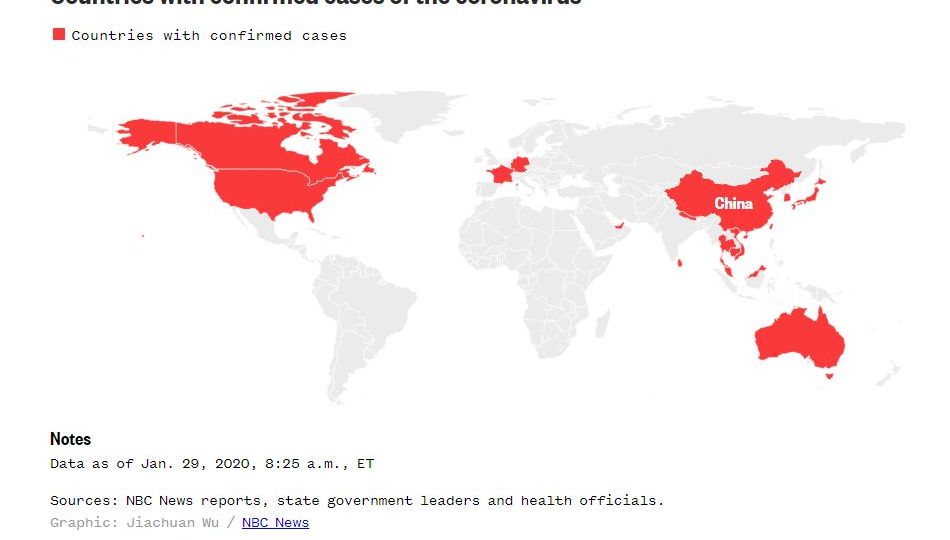
Coronavirus spread is not only threatening people’s health, but it has also become a risk for world economies. Due to the virus, China’s Asian neighbors and commodity exporters will also face difficulties, according to economists.
What is Coronavirus, and what is the situation now?
“Coronavirus is a virus that causes diseases in birds and mammals. It causes respiratory tract infections, which are generally not serious but have a risk of death, diarrhea in cows and pigs, and upper respiratory tract diseases in chickens.” as it is defined on Wikipedia. However, the current Corona Virus outbreak is more than this, according to scientists, and has enormous effects on human life and business life around the world but mostly on China at the moment.
The Chinese scientists are currently working on developing the vaccine to this virus, which is spreading inevitably fast. Together with government scientists in China, the United States and Australia, as well as those working at Johnson & Johnson, Moderna Therapeutics, and Inovio Pharmaceuticals, are all engaged. As of 30.01.2020, 170 Chinese citizens lost their lives due to the “new coronavirus,” and around 7.711 people are confirmed to have the infection.
All the countries around the world are on alert and warned by the World Health Organization to take action against the SARS-like virus, and it has been confirmed to be detected in almost 20 countries at the moment, and the WHO declared a global health emergency.
The economic impact of coronavirus spread
Asian stocks and currencies fell on January 30 as the number of people who died rose, and more cases were reported worldwide. The effects of the virus are already severely impacting China’s economy, the second-largest in the world, as companies cut back on business travel and tourists cancel trips during the traditional Lunar New Year holiday period.
A government economist said the crisis could reduce China’s first-quarter growth by 1.5-2% or less as the crisis affects sectors ranging from mining to luxury goods.
Also, it is stated that the outbreak will create a drop in Chinese tourism revenues in other parts of Asia, especially in Hong Kong and Thailand.
Turkey is among the major trading partners of China. In 2019, Turkey 19.1 billion dollars while imports with China, exports were $ 2.6 billion. Since 2002, the amount of foreign direct investment from China to Turkey reached $ 1 billion 38 million. The number of Chinese tourists came to Turkey last year to 450 thousand. Tourism is expected to be negatively affected at the first stage due to coronavirus.
As a result, tourism all over the world, including Turkey, will have a great loss since the Chinese government banned package tours outside China for a month, which can be extended later.
As economist Eswar Prasad, former head of the International Monetary Fund’s China unit stated, “A broader spread of this disease has the potential to disrupt travel, trade and supply chains throughout Asia, with knock-on effects on the world economy, since Asia is now a key driver of global growth.”
On the other hand, a weakening of the Chinese economy would affect oil demand as the country is the world’s largest importer of crude oil – importing a record 10.12 million barrels per day in 2019 – and the world’s second-largest oil consumer, according to data from the General Administration of Customs.
Important events canceled due to the coronavirus spread
Xiamen Natural Stone and Technologies Fair, one of the world’s largest natural stone fairs planned to be held in China on 16-19 March, and the World Indoor Athletics Championship, which is planned to be held in Nanjing, China on 13-15 March, were delayed due to the coronavirus outbreak.
What are the reactions of important brands?
HONDA
Honda Motor stopped production until February 9 to support efforts to prevent a coronavirus outbreak at two motorcycle factories in China. No explanation was made as to when production will resume at Honda Motor’s 3 automobile plants in Wuhan. The facilities were planned to be operational again on February 3 after the Chinese New Year holiday.
TOYOTA
The Japanese automotive giant announced that it had stopped its production in Tianjin and Guangdong in China until February 9. In addition to Honda and Toyota, PSA Group, owner of General Motors, Nissan, Renault, and Peugeot, also stopped production in China due to coronavirus.
APPLE
The company authorities have stated that they are following the situation in China very closely. They have reduced the number of working hours of their employees in Apple stores in China and limited their travels. The factories which are producing for Apple have stayed closed for more than it is expected, and the mass production, which is planned to start in the third week of February, may be delayed due to the coronavirus.
Google is shutting down all its offices in China temporarily, which are located in China, Hong Kong, and Taiwan, according to the technology website, The Verge.
Together with other U.S. companies, Facebook has also restricted travel to China to keep its employees safe. As Business Insider stated, the company stated that they would not allow the staff to go to China unless it is necessary, they would have a special permit requirement for the staff who had to go to China and would be very sensitive to the issue.
IKEA
Ikea announced that they have temporarily closed all its stores in China due to the coronavirus outbreak. They have 30 stores around China, and half of them closed while the rest shortened their opening hours.
STARBUCKS
Kevin Johnson, CEO of Starbucks, told CNBC that they have closed more than half of its stores in China and wouldn’t hesitate to close more if necessary. The remaining Starbucks shops required people to have their temperatures taken and to wear masks.
International Flights and Transport Links
Turkish Airlines, British Airways, American Airlines, Air Canada, Iberia, Air France, KLM, Lufthansa, Delta Airlines, El Al Israel Airlines, Seoul Air of South Korea and Lion Air Group of Indonesia have canceled, suspended or reduced their flights to and from China because of coronavirus. Other airlines have also started to cancel or suspend their flights to and China since the death toll and number of infected cases increase.
Kazakhstan government declared that it had stopped issuing visas to Chinese citizens and will cut all primary transport links with China. Passenger train services, cross-border bus journeys are suspended as well as regular flights between the two countries.
The government of Russia has also announced that they will limit the number of passenger trains starting from 31.01.2020 and will be active between Moscow and Pekin only.
Comments
Within the light of all this information, the coronavirus spread may have inevitable consequences on the world’s economy, and these consequences may be negative or positive for some countries, depending on their situation. Depending on the progress of the spread of the coronavirus, the world’s economy may experience great changes.
Although the negative effects have been stated in this article, it should be noted that for some countries which are competitors with China in terms of production facilities such as Asian countries, Middle East countries and Turkey, etc., this outbreak may have a positive effect. In the case of a nationwide quarantine in China, all the production facilities and factories would be shut down, and manufacturing would stop. At that point, international brands would look for other alternatives to continue their production. Obviously, among all the other countries, Turkey has an outstanding advantage of its location.
Not only Turkey’s geopolitical position puts the country one step forward, but also production facilities of high quality and high capacity, cultural similarities between European countries are all its advantages compared to Asian and Middle Eastern countries. As a result, Turkey may be the new production hub for important international brands who would like to benefit from the ease of transport, accessibility of the manufacturers, cheap workforce, and customs union with the European countries.

